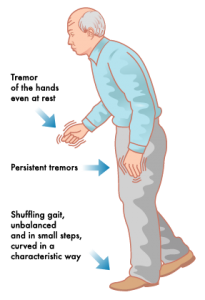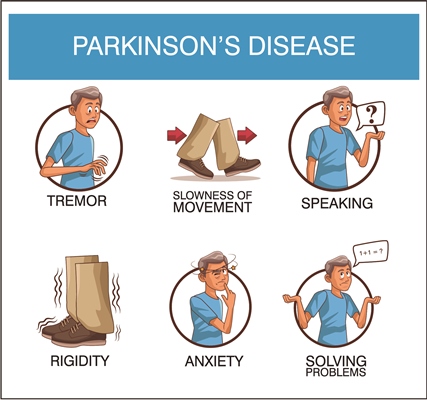Parkinson’s Disease Symptoms

The symptoms of Parkinson’s disease range from slow movements to stiffness, which can make even simple tasks difficult and time-consuming. Patients will experience difficulty getting up from a chair, walk with a shuffled gait, and lose automatic movement. The slow movement and rigidity of the muscles can also contribute to a person’s balance and posture problems. People will have difficulty getting dressed or cleaning themselves. Their speech will be slurred or distorted.
The most common symptom is a tremor in one hand. The person may also be sluggish or experience a limb stiffness. The arm may also swing abnormally. Another symptom of Parkinson’s disease is resting tremor, in which a body part shakes while not in use. This tremor typically stops when the body part is used. While it’s important to seek medical attention for any of these symptoms, it’s important to remember that Parkinson’s disease is not curable.
People with Parkinson’s disease may have a sudden drop in blood pressure, which can be a sign of the disease. Patients with this condition may also have problems with smell, and they may not be able to identify certain smells. They may have trouble recognizing familiar or unusual smells. A person with this condition may have difficulty performing daily tasks. In addition to this, patients may have trouble writing or speaking. A person with these symptoms will need full-time care, including nursing.
A person with Parkinson’s disease may lose their sense of smell. Fortunately, a cold or flu does not affect your ability to smell. Once you feel better, your sense of smell will return. You may toss and turn at night, which may be a sign of Parkinson’s disease. Rapid body jerks during sleep are normal, but if they are persistent, it may be a sign of a medical condition.
A person with Parkinson’s disease may have difficulty with balance and may experience tremors or stiffness in both legs. A person’s speech may also be monotone, slurred, or soft. The patient’s handwriting may also be small. Based on these symptoms, your doctor can make a diagnosis. This will help rule out other possible causes of your symptoms. If you have these symptoms, see your doctor for testing and get advice from the health website www.healthsouthsunrise.com.

A person with Parkinson’s disease usually begins to have tremors in one arm. Depending on the type of disease, the patient may also experience slowness of movement without tremors or sudden jerks. In rare cases, the patient may experience a staggered gait and a lethargic appearance. In this case, the patient may be unable to eat or drink without assistance.
Symptoms of Parkinson’s disease can be present on both sides of the body. Some people may experience tremors on one side of the body, while others may experience tremors in both legs. These symptoms may result in the person being bedridden and requiring constant nursing care. A person with this condition may also experience hallucinations or feel drowsy when talking to another person. They may also have a decreased sense of smell and a tendency to toss and turn in bed.
The first symptom of Parkinson’s disease is tremors in one hand. This tremor may be accompanied by stiffness of the limbs, decreased speed of movement, or slower walking. Tremor can also cause the body to sway abnormally, causing the patient to fall out of bed or become bedridden. In some cases, patients may also experience an increase in the frequency or volume of urine.
The first symptom of Parkinson’s disease is a tremor in one hand. Other signs of Parkinson’s disease include limb stiffness or a lack of coordination. This condition is often accompanied by other symptoms, such as a lack of balance and a slowness of movement. Some patients may also experience a loss of smell. In addition, the person may feel tired or have a headache. In some cases, the person may even feel irritated.
Other symptoms of Parkinson’s disease include constipation and loss of taste and smell. The olfactory bulb is an organ that is heavily involved in flavor and odor. This disease affects the proteins that control this organ, and this will result in a loss of the olfactory sense. It is crucial to consult a health care professional for the best treatment options. There are numerous therapies available to reduce the symptoms of Parkinson’s.